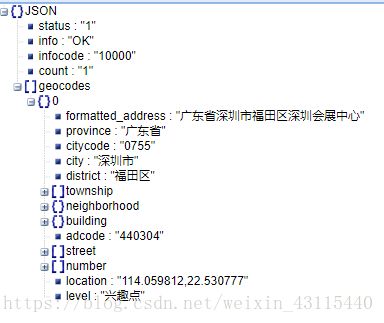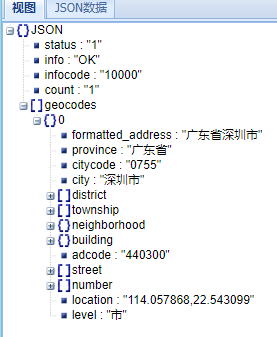Gson解析复杂Json数据
看一下大神的 文章:
使用Gson解析复杂的JSON数据
首先建立依赖
implementation'com.google.code.gson:gson:2.8.0'
然后根据api获取到的json数据
{
"status": "1",
"info": "OK",
"infocode": "10000",
"count": "1",
"geocodes": [
{
"formatted_address": "广东省深圳市福田区深圳会展中心",
"province": "广东省",
"citycode": "0755",
"city": "深圳市",
"district": "福田区",
"township": [
],
"neighborhood": {
"name": [
],
"type": [
]
},
"building": {
"name": [
],
"type": [
]
},
"adcode": "440304",
"street": [
],
"number": [
],
"location": "114.059812,22.530777",
"level": "兴趣点"
}
]
}
这数据一层套一层,看着眼花缭乱,不直观,这里借用
JSON在线视图查看器
把JSON数据贴上去后,点击视图,展开

这就很直观看出来结构了,现在要取出的是location。我们看到,整个JSON数据中,含有5个一级子项,其中一个子项是一个数组geocodes,这个一级子项数组中只有一个元素{},序号为0,里面包含了一大堆子项,某些子项还是数组,但是刚好location不是数组,它就相当于被JSON层,geocodes层,0层这三个层包围,像剥洋葱那样一层一层地剥开就好啦。
建立javabean 类:
用GsonFormat插件来完成生成
Location.java
public class Location {
/**
* status : 1
* info : OK
* infocode : 10000
* count : 1
* geocodes : [{"formatted_address":"广东省深圳市福田区深圳会展中心","province":"广东省","citycode":"0755","city":"深圳市","district":"福田区","township":[],"neighborhood":{"name":[],"type":[]},"building":{"name":[],"type":[]},"adcode":"440304","street":[],"number":[],"location":"114.059812,22.530777","level":"兴趣点"}]
*/
private String status;
private String info;
private String infocode;
private String count;
private List geocodes;
public String getStatus() {
return status;
}
public void setStatus(String status) {
this.status = status;
}
public String getInfo() {
return info;
}
public void setInfo(String info) {
this.info = info;
}
public String getInfocode() {
return infocode;
}
public void setInfocode(String infocode) {
this.infocode = infocode;
}
public String getCount() {
return count;
}
public void setCount(String count) {
this.count = count;
}
public List getGeocodes() {
return geocodes;
}
public void setGeocodes(List geocodes) {
this.geocodes = geocodes;
}
public static class GeocodesBean {
/**
* formatted_address : 广东省深圳市福田区深圳会展中心
* province : 广东省
* citycode : 0755
* city : 深圳市
* district : 福田区
* township : []
* neighborhood : {"name":[],"type":[]}
* building : {"name":[],"type":[]}
* adcode : 440304
* street : []
* number : []
* location : 114.059812,22.530777
* level : 兴趣点
*/
private String formatted_address;
private String province;
private String citycode;
private String city;
private String district;
private NeighborhoodBean neighborhood;
private BuildingBean building;
private String adcode;
private String location;
private String level;
private List township;
private List street;
private List number;
public String getFormatted_address() {
return formatted_address;
}
public void setFormatted_address(String formatted_address) {
this.formatted_address = formatted_address;
}
public String getProvince() {
return province;
}
public void setProvince(String province) {
this.province = province;
}
public String getCitycode() {
return citycode;
}
public void setCitycode(String citycode) {
this.citycode = citycode;
}
public String getCity() {
return city;
}
public void setCity(String city) {
this.city = city;
}
public String getDistrict() {
return district;
}
public void setDistrict(String district) {
this.district = district;
}
public NeighborhoodBean getNeighborhood() {
return neighborhood;
}
public void setNeighborhood(NeighborhoodBean neighborhood) {
this.neighborhood = neighborhood;
}
public BuildingBean getBuilding() {
return building;
}
public void setBuilding(BuildingBean building) {
this.building = building;
}
public String getAdcode() {
return adcode;
}
public void setAdcode(String adcode) {
this.adcode = adcode;
}
public String getLocation() {
return location;
}
public void setLocation(String location) {
this.location = location;
}
public String getLevel() {
return level;
}
public void setLevel(String level) {
this.level = level;
}
public List getTownship() {
return township;
}
public void setTownship(List township) {
this.township = township;
}
public List getStreet() {
return street;
}
public void setStreet(List street) {
this.street = street;
}
public List getNumber() {
return number;
}
public void setNumber(List number) {
this.number = number;
}
public static class NeighborhoodBean {
private List name;
private List type;
public List getName() {
return name;
}
public void setName(List name) {
this.name = name;
}
public List getType() {
return type;
}
public void setType(List type) {
this.type = type;
}
}
public static class BuildingBean {
private List name;
private List type;
public List getName() {
return name;
}
public void setName(List name) {
this.name = name;
}
public List getType() {
return type;
}
public void setType(List type) {
this.type = type;
}
}
}
}
我们看到,需要的location数据被包含在了Location类中的类GeocodesBean里了,建议把GeocodesBean类直接剪切掉,新建一个GeocodesBean类贴进去,把类头的static删掉。最好不要把我们要的数据放在类中类。
即修改后的
Location.java
public class Location {
/**
* status : 1
* info : OK
* infocode : 10000
* count : 1
* geocodes : [{"formatted_address":"广东省深圳市坪山区六角大楼","province":"广东省","citycode":"0755","city":"深圳市","district":"坪山区","township":[],"neighborhood":{"name":[],"type":[]},"building":{"name":[],"type":[]},"adcode":"440310","street":[],"number":[],"location":"114.360910,22.678323","level":"兴趣点"}]
*/
private String status;
private String info;
private String infocode;
private String count;
private List geocodes;
public String getStatus() {
return status;
}
public void setStatus(String status) {
this.status = status;
}
public String getInfo() {
return info;
}
public void setInfo(String info) {
this.info = info;
}
public String getInfocode() {
return infocode;
}
public void setInfocode(String infocode) {
this.infocode = infocode;
}
public String getCount() {
return count;
}
public void setCount(String count) {
this.count = count;
}
public List getGeocodes() {
return geocodes;
}
public void setGeocodes(List geocodes) {
this.geocodes = geocodes;
}
}
GeocodesBean.java
public class GeocodesBean {
/**
* formatted_address : 广东省深圳市坪山区六角大楼
* province : 广东省
* citycode : 0755
* city : 深圳市
* district : 坪山区
* township : []
* neighborhood : {"name":[],"type":[]}
* building : {"name":[],"type":[]}
* adcode : 440310
* street : []
* number : []
* location : 114.360910,22.678323
* level : 兴趣点
*/
private String formatted_address;
private String province;
private String citycode;
private String city;
private String district;
private NeighborhoodBean neighborhood;
private BuildingBean building;
private String adcode;
private String location;
private String level;
private List township;
private List street;
private List number;
public String getFormatted_address() {
return formatted_address;
}
public void setFormatted_address(String formatted_address) {
this.formatted_address = formatted_address;
}
public String getProvince() {
return province;
}
public void setProvince(String province) {
this.province = province;
}
public String getCitycode() {
return citycode;
}
public void setCitycode(String citycode) {
this.citycode = citycode;
}
public String getCity() {
return city;
}
public void setCity(String city) {
this.city = city;
}
public String getDistrict() {
return district;
}
public void setDistrict(String district) {
this.district = district;
}
public NeighborhoodBean getNeighborhood() {
return neighborhood;
}
public void setNeighborhood(NeighborhoodBean neighborhood) {
this.neighborhood = neighborhood;
}
public BuildingBean getBuilding() {
return building;
}
public void setBuilding(BuildingBean building) {
this.building = building;
}
public String getAdcode() {
return adcode;
}
public void setAdcode(String adcode) {
this.adcode = adcode;
}
public String getLocation() {
return location;
}
public void setLocation(String location) {
this.location = location;
}
public String getLevel() {
return level;
}
public void setLevel(String level) {
this.level = level;
}
public List getTownship() {
return township;
}
public void setTownship(List township) {
this.township = township;
}
public List getStreet() {
return street;
}
public void setStreet(List street) {
this.street = street;
}
public List getNumber() {
return number;
}
public void setNumber(List number) {
this.number = number;
}
public static class NeighborhoodBean {
private List name;
private List type;
public List getName() {
return name;
}
public void setName(List name) {
this.name = name;
}
public List getType() {
return type;
}
public void setType(List type) {
this.type = type;
}
}
public static class BuildingBean {
private List name;
private List type;
public List getName() {
return name;
}
public void setName(List name) {
this.name = name;
}
public List getType() {
return type;
}
public void setType(List type) {
this.type = type;
}
}
}
然后解析的函数就好写了:
private void parseJSONWithGSON(String jsonData){
Gson gson =new Gson();
Location jdata=gson.fromJson(jsonData,Location .class);//解析掉第一层
List beanList= jdata .getGeocodes();//getGeocodes()得到的就是一个数组[],封装为list
Log.e("TAG","location:"+beanList.get(0).getLocation());//list的第一个(即序号0)的数据中就含有location
}
这样就可以打印出经纬度数据了。
10月9日下午2点更新
这个解析部分在解析地址为市级别和省级别(比如深圳,香港)的时候,解析部分会发生崩溃。
查看具体地点名,城市名,省级行政区三种情况的Json数据



发现区别只在3个参数:city,citycode,district,所以去GeocodesBean.java中把它们注释掉就好了。
更改后的GeocodesBean.java
public class GeocodesBean {
/**
* formatted_address : 广东省深圳市坪山区六角大楼
* province : 广东省
* citycode : 0755
* city : 深圳市
* district : 坪山区
* township : []
* neighborhood : {"name":[],"type":[]}
* building : {"name":[],"type":[]}
* adcode : 440310
* street : []
* number : []
* location : 114.360910,22.678323
* level : 兴趣点
*/
private String formatted_address;
private String province;
/*private String citycode;
private String city;
private String district;*/ //注释掉这些就可以查询市,省级级别的地区了,比如香港,广东,深圳等
private NeighborhoodBean neighborhood;
private BuildingBean building;
private String adcode;
private String location;
private String level;
private List township;
private List street;
private List number;
public String getFormatted_address() {
return formatted_address;
}
public void setFormatted_address(String formatted_address) {
this.formatted_address = formatted_address;
}
public String getProvince() {
return province;
}
public void setProvince(String province) {
this.province = province;
}
/* public String getCitycode() {
return citycode;
}
public void setCitycode(String citycode) {
this.citycode = citycode;
}
public String getCity() {
return city;
}
public void setCity(String city) {
this.city = city;
}
public String getDistrict() {
return district;
}
public void setDistrict(String district) {
this.district = district;
}*/
public NeighborhoodBean getNeighborhood() {
return neighborhood;
}
public void setNeighborhood(NeighborhoodBean neighborhood) {
this.neighborhood = neighborhood;
}
public BuildingBean getBuilding() {
return building;
}
public void setBuilding(BuildingBean building) {
this.building = building;
}
public String getAdcode() {
return adcode;
}
public void setAdcode(String adcode) {
this.adcode = adcode;
}
public String getLocation() {
return location;
}
public void setLocation(String location) {
this.location = location;
}
public String getLevel() {
return level;
}
public void setLevel(String level) {
this.level = level;
}
public List getTownship() {
return township;
}
public void setTownship(List township) {
this.township = township;
}
public List getStreet() {
return street;
}
public void setStreet(List street) {
this.street = street;
}
public List getNumber() {
return number;
}
public void setNumber(List number) {
this.number = number;
}
public static class NeighborhoodBean {
private List name;
private List type;
public List getName() {
return name;
}
public void setName(List name) {
this.name = name;
}
public List getType() {
return type;
}
public void setType(List type) {
this.type = type;
}
}
public static class BuildingBean {
private List name;
private List type;
public List getName() {
return name;
}
public void setName(List name) {
this.name = name;
}
public List getType() {
return type;
}
public void setType(List type) {
this.type = type;
}
}
}
最后搞定啦